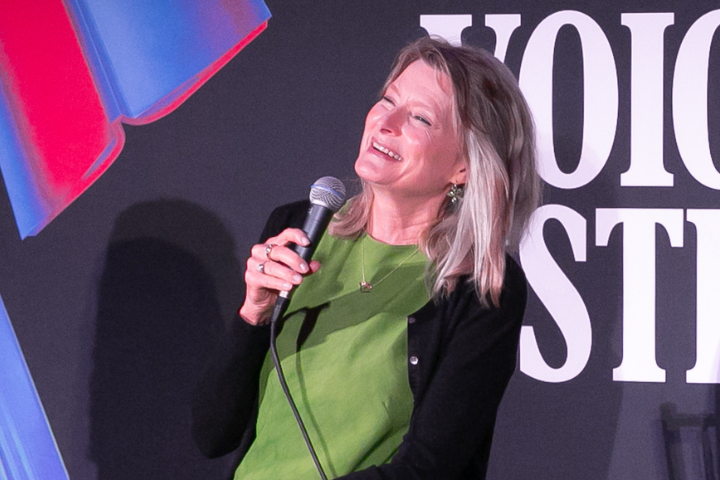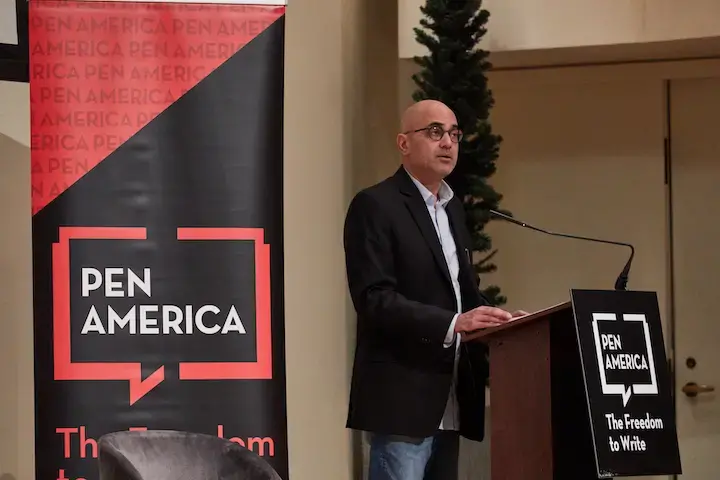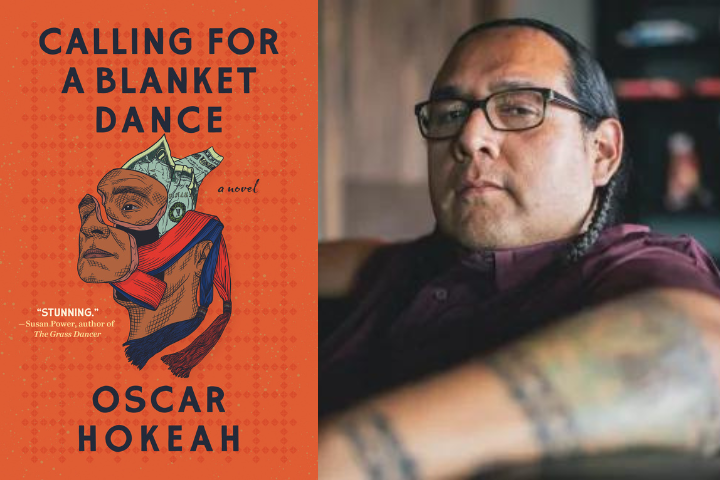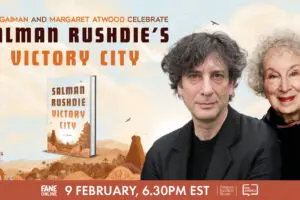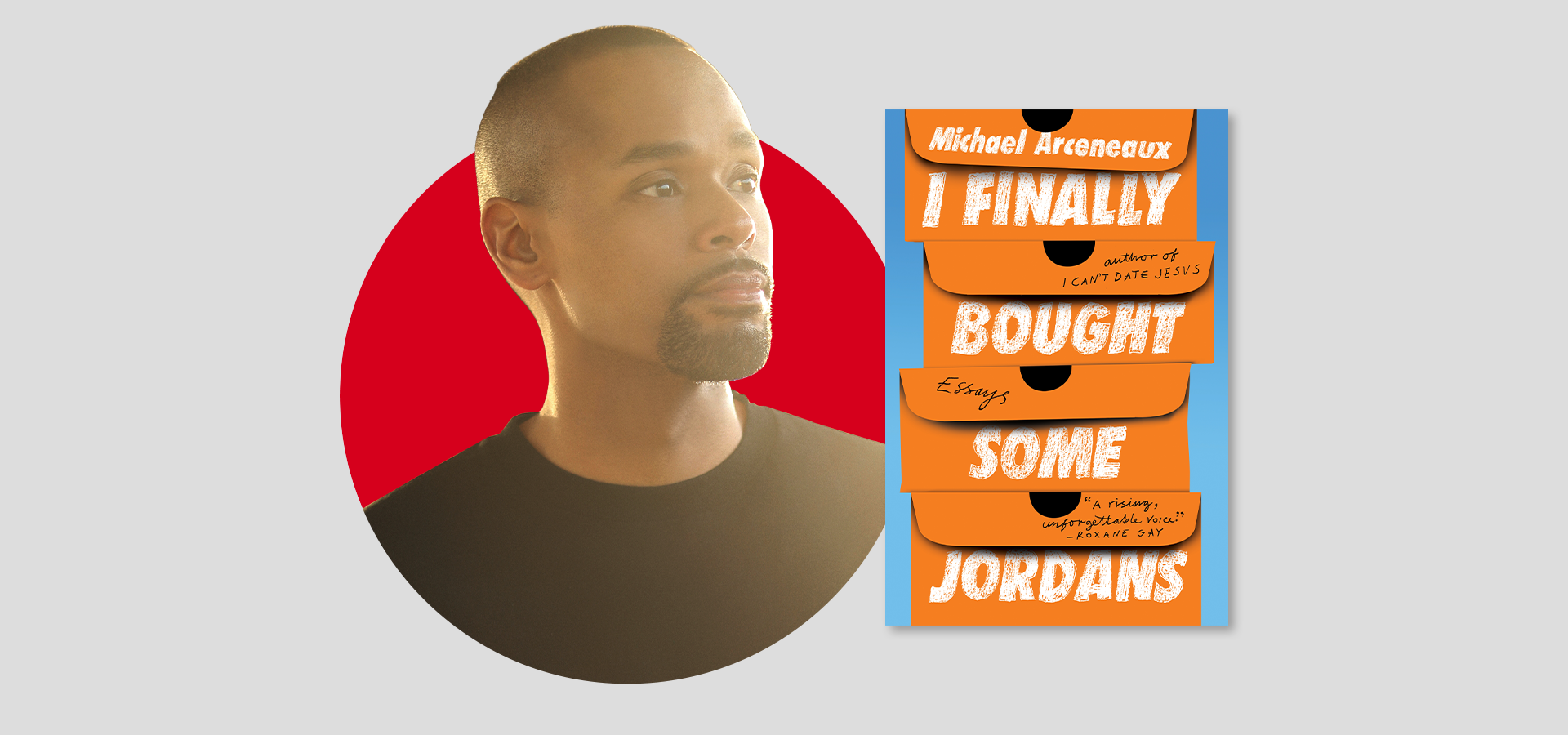
Michael Arceneaux | The PEN Ten Interview
March 7, 2024
Michael Arceneaux discusses race, labor, and culture in his third essay collection I Finally Bought Some Jordans (Harper Collins, 2024). He recounts the pinnacle moments of his life that have guided him through a patriarchal society. Arceneaux’s stories define what it means to be a Black creative in the publishing world, the challenges of dating amidst COVID-19, and how his role as a son and uncle played a part in his development. I Finally Bought Some Jordans serves as a reminder that we will all be okay and that listening to some Beyonce won’t hurt.
In conversation with PEN America’s World Voices Festival and Literary Programs Intern, Natasha Santana, for this week’s PEN Ten, Michael Arceneaux discusses epiphanies, dating during a pandemic, and life as a Black creative. (Bookshop; Barnes & Noble)
1. How does it feel to be on your third book of personal essays? What was different about writing this one?
It took a lot of effort to get my first book sold, so to be on my third is a blessing and I have immense gratitude for the opportunity.
Having said that, as people will read in the book, I was dealing with a lot of grief in the writing of this book and that was further complicated by my mom being diagnosed with cancer. She has only recently passed away, so while I am fortunate to be able to say I am now an author of three, this is a bit of a surreal experience for me to be so deep in grief during what is supposed to be a celebratory (albeit stressful) time. But she let me know how proud she was of me when she had to leave us and this book is dedicated to her, so as difficult a time as this is, she would want me to be proud of getting this far.
2. You not only write about your life but also comment on events that occur in the world such as presidential elections and COVID-19. As the world is changing politically and socially, where do you hope your work like I Finally Bought Some Jordans fits into that evolution?
Well, I hope people see in chapters like “I Thought You Could Only Melt In Texas” that we are already living through the policy failures related to climate change and see it as a preview of what’s to come for others, sadly. I did not like people mocking folks in Texas during the time of the freeze and power grid failure because it’s a “red state.” The people who suffered the worst – along with my toes – did not vote for the people responsible.
Likewise, later this year, the most marginalized among us will be lectured about their political apathy. As if people have no reason to feel hopeless about our political system. Instead of condescending to voters – especially the Black working class and poor ones – that some of us do understand.
“I don’t tailor my creative impulses to anyone’s expectations but my own. I’m very clear about what I want to say and how I want to say it when I try to sell a book. You either believe in it or you don’t.“
3. You talk about how difficult and daunting it can be to enter publishing spaces due to their exclusivity and whiteness. How do you manage their expectations with your own creative impulses?
I don’t tailor my creative impulses to anyone’s expectations but my own. I’m very clear about what I want to say and how I want to say it when I try to sell a book. You either believe in it or you don’t. I’m fortunate that I have an editor that isn’t white and believes in my voice and only tries to strengthen it as opposed to tampering it down for the sake of being published.
I suppose I’ve had more of a direct challenge when working on some of the TV adaptations of my previous books with respect to managing others’ expectations of your creative work, but ultimately, I have a voice and a point of view, and while I can compromise, I’m not going to dilute myself.
4. At the beginning of I Finally Bought Some Jordans you mention social media and how you stop yourself from commenting online in order to pursue your greater ambitions. How do you channel your energy away from technology and into your books?
I wouldn’t say I stopped it in pursuit of my greater ambitions per se. I still have a strong point of view and still write for a living. I do acknowledge, though, I have become more cautious about how I express myself and where I express myself. As I mention later in the book, I like social media less and less each year and generally find most discourse to be purposeless now.
It used to be fun but often feels less so now. Maybe that changes for me and I get back into the habit at some point, but to your question, instead of tweeting all of my thoughts, if I feel that strongly about something, I go write it out somewhere else. Like this book.
“I’m more bothered by having to live the burdens I wrote about than to write about them myself. But, during what’s not the best emotional time for me currently, I stick to the simple advice others that understand have shared with me: be kind to yourself.“
5. I really enjoyed when you said, “I don’t often get the opportunity to tell people I write about how I feel about something they’ve done or said. But I try not to waste the chance when it comes.” It made me wonder, who have you met that has had the greatest impact on you? What did you say to them?
Probably Mary J. Blige. I wrote about this in my first book, I Can’t Date Jesus, but basically I met her as a radio intern and handed her a note explaining how much her music meant to me even as a young child. I didn’t have the easiest, most peaceful childhood so I understood the pain she sang about a lot sooner than I should have. She appreciated the note so much that she ended up calling me and leaving me a voicemail. We briefly spoke about a week later, but she expressed such gratitude, and for me, it was the first time I felt like my writing impacted someone in a real way. The fact that it was someone who has meant so much to me in my dark times made it all the better.
6. We both adore Toni Braxton, and you talk about your affinity to music as it guides you through hardships or writer’s block. How has music impacted your writing?
I’m not usually one of those people who can write to music – at least not anything that will lead to me singing along, body rolling, and/or wishing I was in the studio versus at the keyboard. But, if I’m starting out early into something I am working on, I can listen to music. Lately maybe Destin Conrad, Kali Uchis, or Summer Walker. Always Sade. And yes, some Toni – even deep cuts like “Always.”
When I’m actually writing, though, if I do have music on, it’s maybe João Gilberto but probably just some video game soundtrack playlist I found. Years ago, I went out with someone from my gym. It led nowhere but he gave me that tip and I’ve used it for years.
7. In the chapter “Who All Gon’ Be There” you talk about being able to connect with people via your writing. With restrictions lifted for in person book tours, what is something you hope to get out of this book release?
My hope is, as always, that people actually show up. After that, as long as you don’t mind that I’m gay and might talk about it and keep your hands to yourself – the chapter explains this too – I’m just grateful people care and want to talk to me about the book. I hated not being able to tour in 2020 because of the plague so this will hopefully be a light for me in a dark time.
8. Throughout your personal essays, there is this message of how America displaces the LGBTQ+ and Black communities through elections, housing, and even in literature. How do you manage your emotional well-being when writing about topics that impact you personally?
I’m more bothered by having to live the burdens I wrote about than to write about them myself. But, during what’s not the best emotional time for me currently, I stick to the simple advice others that understand have shared with me: be kind to yourself. I try to do that as best I can every single day. It does make a difference.
“None of us know how much time we have with the people we love. Make good use of it. And be grateful.“
9. Family plays a pivotal role in an epiphany that you have where you realize who matters the most to you. Which writers played the biggest role while you were writing I Finally Bought Some Jordans? Did you have any epiphanies reading their work?
I try to avoid reading other people while working on my own book, but because this period was longer than the timeframe I had for my first two books, I did at least finally read Deesha Philyaw’s The Secret Lives of Church Ladies, which I loved.
10. In the chapter “I Finally Bought Some Jordans” you recognize that you should appreciate small things, such as the moment when you finally bought your own pair of Jordans. What are the small moments you’ve been through while writing this book that have had the greatest impact on you?
Every day I talked to my mom. As I mention throughout the book, none of us know how much time we have with the people we love. Make good use of it. And be grateful.
Michael Arceneaux is the New York Times-bestselling author of I Can’t Date Jesus, I Don’t Want To Die Poor, and his latest, I Finally Bought Some Jordans. He is currently doing the best with what he’s got in Los Angeles.
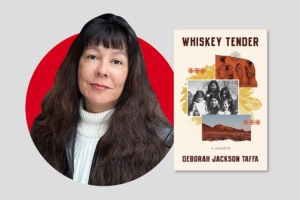
Deborah Jackson Taffa | The PEN Ten Interview
I could only share my family’s trauma if I told it in context, reminding readers that my elders struggled, not because of a moral failure on their part, but because of societal and governmental pressures.
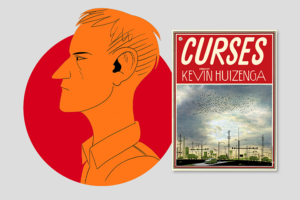
Kevin Huizenga | The PEN Ten Interview
I like to be productive, and sometimes being productive means taking an idea you thought up in a previous story, and expanding on it, or turning it around to look at it from another angle.
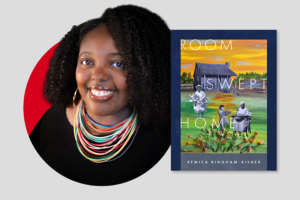
Remica Bingham-Risher | The PEN Ten Interview
Some of the breakthrough moments came when I decided I would be reckoning not only with my ancestress’s trauma, but also their joy, and how they raised us to understand that you can overcome nearly anything in your journey.
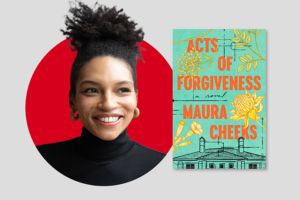
Maura Cheeks | The PEN Ten Interview
I was thinking about what would have to be true for someone in power to take a stand for reparations and push it through.

